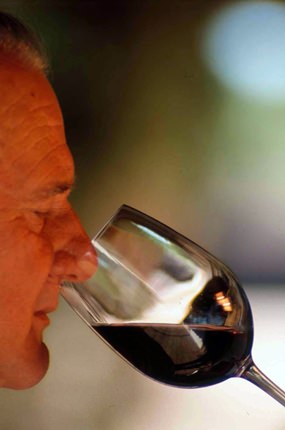When the Spanish conquistadors and missionaries showed up in Chile during the middle of the sixteenth century, they brought with them a grape variety unflatteringly known as “the common black grape”. It was eventually planted all over the country and was the ancestor of the Pais grape, which today is the most widely-planted variety in the country. Although it’s easy to grow, it produces thin-bodied, rustic red wine which is evidently popular with some of the locals.
The Chilean wine industry developed very quickly during the 1700s and by the mid-nineteenth century, most French and Italian grape varieties had been brought into the country. With of the arrival of Bordeaux varieties, the country entered the modern era of winemaking. Even so, during the twentieth century the industry had its ups and downs and it wasn’t until the 1970s that wine production really got back on its feet.
 Nosing around: Hugo Casanova at work.
Nosing around: Hugo Casanova at work.
The first members of the Casanova family arrived in Chile at the end of the nineteenth century, by which time the country’s wine industry was well-developed. You might be wondering whether the family is connected in some way with that infamous eighteenth century adventurer and womanizer, Giovanni Giacomo Casanova. At different times in his life he was a gambler, a magician, an alchemist, a violinist and at one point, a spy for the Venetian inquisitors. At one stage, he became a cardinal, but was hastily fired amid an inevitable scandal. If indeed the Casanova wine family has any connection, I can understand them preferring to keep quiet about it.
Over the years the family achieved an enviable reputation in wine-making and today the Hugo Casanova Winery has an annual production of over a million litres. The company’s entry-level range is sold under the Purisima brand. I’ve tasted several of the Purisima wines and I’ve always been impressed with their quality. And in case you’re wondering, Purisima means “extremely pure” in Spanish. The Purisima Reserva Estate wines offer excellent value and bring out the essential characteristics of the grape. Of course, it’s largely about terroir, that French word that encompasses everything in the vineyard from the soil, the location, the climate and any other conditions which influence the growth of the vines.
The Reserva Estate reds are made by ageing 60% of the wine in French oak barrels for ten months, while the remainder is stored in stainless steel tanks. Nowadays this is quite a common approach in wine-making and helps to produce wines with a good balance of fruit, body and freshness.
Purisima Reserva Estate Cabernet Sauvignon 2011 (red) Chile (Bt. 685 @ Foodland)
The Cabernet character is very pronounced and the aromas and taste are sharply focused. After you’ve given the wine a bit of aeration, you’ll get the typical Cabernet aroma of blackcurrants, plums, dried herbs and spices. In the background you might pick up a dash of mint and a hint of woodiness. Anyway, there’s plenty in there to keep you interested. And I hope you do really give it a good nosing. Several of my wine-drinking acquaintances merely take a few cursory sniffs as though they are checking that the milk hasn’t gone off. Not enough. You’re paying for the aroma, so you may as well make the most of it.
And that’s another thing. Some people just don’t understand that many red wines need air. It’s no good whipping the cork out and leaving the bottle on the table for two or three minutes, even though you see this done in restaurants all the time. Different wines need different aeration times to show at their best, but this is only a general rule. Some wine connoisseurs prefer their wine to have as little air contact as possible on the grounds that any air causes damage. But to my mind, many reds tend to feel a bit tight and tense when poured straight out of the bottle. If you want something a bit more rounded, pour it into the decanter and leave it for ten to twenty minutes. No dainty pouring techniques are needed here. Just invert the bottle over the decanter and let the wine slosh around a bit.
On the palate, this Reserva is mature and rounded with a delightfully soft mouth-feel, plenty of fruit and peppery spices. It’s as dry as a bone and there’s a pleasing layer of tannin that follows through on the long finish. With nearly 14% alcohol content, the wine has a touch of authority too and would make an excellent partner for hearty dishes, rich stews or assertive cheeses.
Purisima Reserva Estate Merlot 2010 (red) Chile (Bt. 685 @ Foodland)
As you pour this wine you’ll notice the colour. It’s very, very dark. All the characteristic Merlot qualities are there on the aroma, mixed red berries with hints of cherries, blackberries, herbs and woodland brambles. You might detect a distant hint of vanilla and cedar wood. The aromas are dark and brooding, like the smell of damp, fresh forest earth. This beguiling aroma is one of the qualities I enjoy about a good Merlot.
There’s plenty of fruit on the palate and this self-assured wine is as dry as they come, with a good solid base of tannin, a touch of spice and a long extra-dry finish. It also has a striking earthy, elemental quality and a kind of attractive grittiness to the texture. If you have been led to believe that Merlot is just red, bland and boring, give this one a try and prepare to change your mind. This is a splendid example and I think it would show best with food, perhaps beef steak, rich stews or other hearty dishes. It’s just under 14% alcohol content and I’d suggest that you give this wine about twenty minute’s aeration otherwise it might seem a bit unyielding. I found that even after an hour in the decanter, the texture had softened considerably and the aromas were much more confident. Honestly, it was like tasting a different wine.




